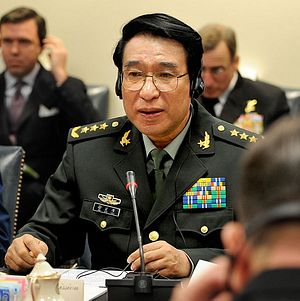Chinese General Xu Caihou was stripped of his CCP membership on Monday, becoming highest-ranking military official to be brought down by charges of graft. In Chinese media reports, Xu was held up as the largest “tiger” to be brought down by Xi’s anti-corruption campaign.
Xu served as vice-chairman of China’s Central Military Commission, making him the highest military official during Hu Jintao’s administration according to China Daily (although Hu, interestingly, was not identified by name, with the paper instead referencing “the previous Chinese leadership”). Chinese media also emphasized that Xu was the highest-ranking military leader to be investigated since China entered its period of reform and opening under Deng Xiaoping.
Xu stands accused of accepting bribes, both directly and through his family members, from those who wanted his help in securing promotions. He was also accused of accepting bribes to assist others in unspecified business endeavors. Xinhua noted that Xu’s case has been forwarded on to prosecutors, meaning he may face a criminal trial. Misdeeds by CCP members are first investigated by the Party, a process that concluded with Xu’s ouster, and only then turned over to prosecution by the legal system. Christopher Johnson, a China analyst at CSIS, says Xu is “virtually certain to face trial.”
Xu’s ouster comes just over two months after Gu Junshan, who served as deputy head of the PLA General Logistics Department, was charged with bribery and abuse of power. At the time, Gu’s case was widely seen as a preliminary step in charging Xu, who allegedly received bribes from Gu Junshan.
The decision to oust Xu was met with public shows of support from PLA leadership. A PLA Daily editorial [Chinese] urged the military to “firmly support the CCP Central Committee’s correct decision.” The article praised the CCP’s move to expel Xu, saying it demonstrated not only the Party’s “zero tolerance” for corruption but also its dedication to “protecting the positive image of the people’s military.” The latter point is especially important; historically, the PLA has been largely exempt from public corruption probes out of a desire to preserve its image. Now, PLA Daily argues that prosecuting Xu actually helps boost public perceptions of the PLA. Xinhua also quoted heavily from the editorial in its own article, further underlining the united front between CCP and PLA.
The news about Xu, like China’s anti-corruption campaign in general, has been interpreted in several different ways. Among those who feel that Xi’s anti-corruption drive is a purge in disguise, Xu’s rumored ties to former president Jiang Zemin might have been the reason for his downfall. Johnson pointed out that Xu was one of Jiang’s “closest allies in the PLA,” an area where the former leader had enjoyed immense influence even after he officially retired. Seen in this light, charging Xu with corruption is a move to help solidify Xi’s grip on power, particularly over the military.
But there’s far more to this case than a simple purge — Xi and others, including military leaders, have been growing increasingly alarmed that corruption poses a real threat to the preparedness of China’s military. A story this week in Bloomberg highlights that corruption in the military starts from the very bottom, with bribes by potential recruits paid out to secure a place in the PLA. “Graft begins in rural areas and smaller towns even before recruits go past the door,” the article points out. One source tells Bloomberg that the cost of enlisting in Jiangxi is at least 50,000 RMB ($8,000) — and that’s for those who have strong personal connections or guanxi. For the less fortunate, the cost is closer to 100,000 RMB ($16,000). Once inside the military, of course, the temptation continues to offer bribes for choice assignments or promotions, and to accept bribes from others as you move up the ranks.
There’s a growing concern in China that such endemic corruption is actively harming China’s military readiness. China recently lowered the physical standards for enlisting in the army, but raised the academic standards (for example, increasingly requiring a high school diploma for recruits) in an attempt to raise the quality of the average recruit. Yet without an effort to tackle corruption, new standards are effectively useless — a bribe will prove more useful than ability. Thus corruption is not only an image problem, but an active threat to China’s attempt to recruit talented, well-educated soldiers.
Finally, as Russell Leigh Moses noted earlier for Wall Street Journal, there’s a strong indication that Xi’s anti-corruption campaign is a means of achieving the larger end of reform. By removing the powerful from their positions, Xi is effectively removing roadblocks for his future reform agenda. Moses was talking about Xi’s plan to reform the energy sector, an area hard-hit by the anti-corruption drive, but the same logic holds true for the take-down of Xu.
Xi has an ambitious plan to reform China’s military, including restructuring its command and giving more weight to the navy and air force branches. The Financial Times notes that this would be the most drastic reform to the PLA since 1985, when Deng Xiaoping reduced the number of China’s military regions from 11 to seven. But such reforms are difficult to pass given heavy resistance from current stakeholders, especially powerful leaders with China’s ground forces who are reluctant to cede power to other branches. Xu’s ouster could serve as a warning to those who might be tempted to get in the way of Xi’s reform agenda for the military. It also helps reinforce that the CCP controls the PLA, not the other way around.
































